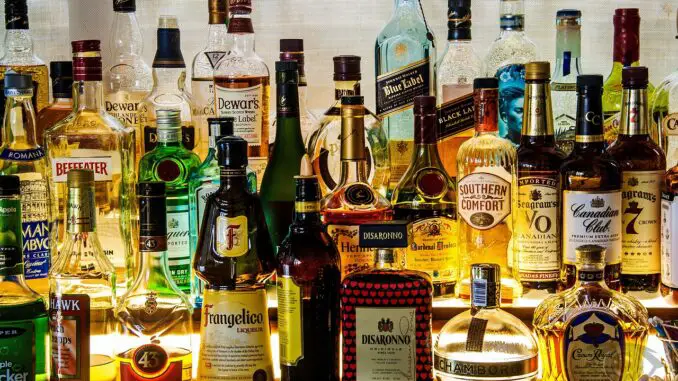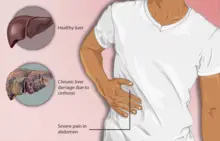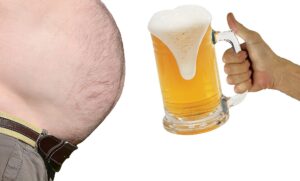
For those with fatty liver, one of the biggest questions is which types of alcohol are best for their condition. While there isn’t a definitive answer to this question, it’s important to understand the risks and benefits associated with different alcohol types. In this blog post, we’ll explore the best alcohol for fatty liver and how you can enjoy a drink without putting your health in danger. We’ll also provide some tips on how to reduce the risks associated with drinking alcohol in general. So if you have fatty liver and you want to find out which alcoholic beverages are best for you, read on!
What is Fatty Liver Disease?
Fatty liver disease, also known as hepatic steatosis, is a condition in which fat accumulates in the liver cells. Although the exact cause is unknown, it is believed to be associated with obesity, diabetes, and high cholesterol. Symptoms of fatty liver disease include fatigue, weight loss, and abdominal pain (1). In severe cases, the liver may become enlarged and damage may occur to the organ. Treatment typically involves lifestyle changes such as weight loss and exercise. In some cases, medication may be necessary to control symptoms.
The Link Between Alcohol and Fatty Liver Disease
There are many potential causes of fatty liver disease, but one of the most common is alcohol abuse. Alcohol abuse can lead to an accumulation of fat in the liver, which can eventually lead to the development of fatty liver disease (2).
The link between alcohol and fatty liver disease is well-established. In fact, alcoholic fatty liver disease is the most common type of fatty liver disease. Alcohol abuse is thought to contribute to the development of fatty liver disease by a number of mechanisms. First, alcohol consumption can lead to an increase in the amount of fat that is stored in the liver. Second, alcohol metabolism produces toxic byproducts that can damage the liver cells and promote inflammation. Finally, chronic alcohol consumption can interfere with the normal functioning of the liver, making it more difficult for the organ to break down and store fats.
If you are concerned about your risk of developing fatty liver disease, it is important to cut back on your alcohol consumption or avoid alcohol altogether. If you already have fatty liver disease, abstaining from alcohol is essential to preventing further damage to your Liver and avoiding complications such as cirrhosis or liver cancer.
How does Alcohol Affect the Liver?
The liver is responsible for metabolizing and breaking down alcohol. Alcohol is metabolized by the liver enzymes alcohol dehydrogenase (ADH) and aldehyde dehydrogenase (ALDH). These enzymes convert alcohol into acetaldehyde, which is then broken down into acetic acid. Acetaldehyde is a toxic compound that can damage liver cells and lead to fatty liver disease (3).
Excessive alcohol consumption can lead to an accumulation of fat in the liver, which can eventually lead to alcoholic hepatitis and cirrhosis. Alcoholic hepatitis is a condition characterized by inflammation of the liver. Cirrhosis is a condition in which the liver becomes hard and scarred.

Heavy drinking can also cause problems with the pancreas, which can lead to pancreatitis. Pancreatitis is a serious condition that can be fatal.
If you have fatty liver disease, it is important to stop drinking alcohol completely. If you continue to drink, you will increase your risk of developing serious health complications.
Best Alcohol Choices for those with Fatty Liver Disease
When it comes to alcohol and fatty liver disease, moderation is key. That means limiting yourself to no more than one drink a day if you’re a woman, and two drinks if you’re a man. And, it’s important to choose the right type of alcohol.
The best alcoholic beverages for people with fatty liver disease are those that are low in sugar. That includes most types of dry wines, and distilled spirits like vodka, gin, and tequila. Some light beers and wine spritzers may also be good choices.
So, when choosing an alcoholic beverage if you have fatty liver disease, stick to low-sugar options and drink in moderation. This will help keep your liver healthy and prevent further damage.
Worst Alcohol Choices for those with Fatty Liver Disease
If you have fatty liver disease, you need to be careful about the alcohol you consume. Some types of alcohol are worse for your liver than others. Here are the worst choices:
- Beer: Beer is high in carbohydrates, which can lead to fat buildup in the liver.
- Hard liquor: Hard liquor is more likely to damage the liver than beer or wine. It’s also important to avoid mixed drinks, as they often contain sugary mixers that can worsen liver damage.
- Wine: While wine may not be as damaging as hard liquor, it still contains sugar and other chemicals that can harm the liver. Red wine is especially bad for fatty liver disease.
- Flavored alcoholic beverages: These drinks are often full of sugar and other unhealthy ingredients. They can be very dangerous for someone with fatty liver disease.
- Caffeinated alcoholic beverages: These drinks combine alcohol with caffeine, which can be a dangerous combination for someone with fatty liver disease. The caffeine can cause dehydration and make it harder for your body to process the alcohol, leading to more damage to your liver
Tips for Drinking Alcohol with Fatty Liver Disease
If you have fatty liver disease, you may be wondering what kind of alcohol is best for you. Here are a few tips to help you make the best choice:
- Avoid alcoholic beverages that are high in sugar. Sugar can contribute to fat buildup in the liver and make your condition worse. Instead, choose drinks that are low in sugar or sugar-free.
- Stick to moderate drinking. Even if you choose alcohol that is low in sugar, it’s important to stick to moderate drinking. Too much alcohol can still damage your liver. The American Liver Foundation recommends no more than two drinks per day for men and one drink per day for women.
- Be aware of other ingredients in your drink. In addition to sugar, some alcoholic beverages contain other ingredients that can be harmful to your liver. For example, some beers contain gluten, which can worsen fatty liver disease. So be sure to check the label before you buy any alcoholic beverage.
- Talk to your doctor about your drinking habits. If you have fatty liver disease, it’s important to talk to your doctor about your drinking habits so they can help you make the best decisions for your health

Lifestyle Changes to Improve Fatty Liver Disease
If you’re struggling with fatty liver disease, making some lifestyle changes can help. Here are a few changes you can make to improve your fatty liver disease:
- Lose weight if you’re overweight. Fatty liver disease is often associated with obesity, so losing weight can help reduce your risk of developing the condition or making it worse.
- Eat a healthy diet. Eating a diet that’s high in healthy fats, like olive oil and fish, and low in unhealthy fats, like saturated and trans fats, can help improve your fatty liver disease.
- Exercise regularly. Exercise can help you lose weight and improve your overall health, both of which can reduce your risk of fatty liver disease.
- Limit your alcohol intake. Drinking too much alcohol is a major cause of fatty liver disease, so cutting back on your intake can help improve your condition.
- Quit smoking if you smoke cigarettes. Cigarette smoking is another major risk factor for developing fatty liver disease, so quitting smoking can help reduce your risk.
When to Seek Medical Help for Fatty Liver Disease?
If you think you may have fatty liver disease, it is important to seek medical help. Your doctor will be able to confirm the diagnosis and recommend the best course of treatment. In some cases, fatty liver disease can be reversed with lifestyle changes, such as weight loss and reduced alcohol intake. However, in other cases, the damage to the liver may be more severe and require more aggressive treatment. If you have fatty liver disease, it is important to follow your doctor’s recommendations and get regular checkups to monitor your condition.
Article Studies, References, and Resources
- Fatty Liver Disease (Hepatic Steatosis) Written by Paige FowlerMedically Reviewed by Carol DerSarkissian, MD https://www.webmd.com/hepatitis/fatty-liver-disease
- Alcoholic Liver Disease: Pathogenesis and Current Management by Natalia A. Osna, Ph.D – https://www.ncbi.nlm.nih.gov/pmc/articles/PMC5513682/
- Acetaldehyde adducts in alcoholic liver disease By Mashiko Setshedi https://www.ncbi.nlm.nih.gov/pmc/articles/PMC2952076/


Its like you read my mind You appear to know so much about this like you wrote the book in it or something I think that you can do with a few pics to drive the message home a little bit but other than that this is fantastic blog A great read Ill certainly be back
It’s in point of fact a nice and useful piece of information. I am
happy that you shared this helpful info with us. Please keep us informed like this.
Thank you for sharing.
Hi, Neat post. There’s an issue along with your
site in internet explorer, would check this? IE nonetheless is the
market chief and a big component of other people will miss your great writing because of this problem.
I was suggested this web site by my cousin Im not sure whether this post is written by him as no one else know such detailed about my trouble You are incredible Thanks